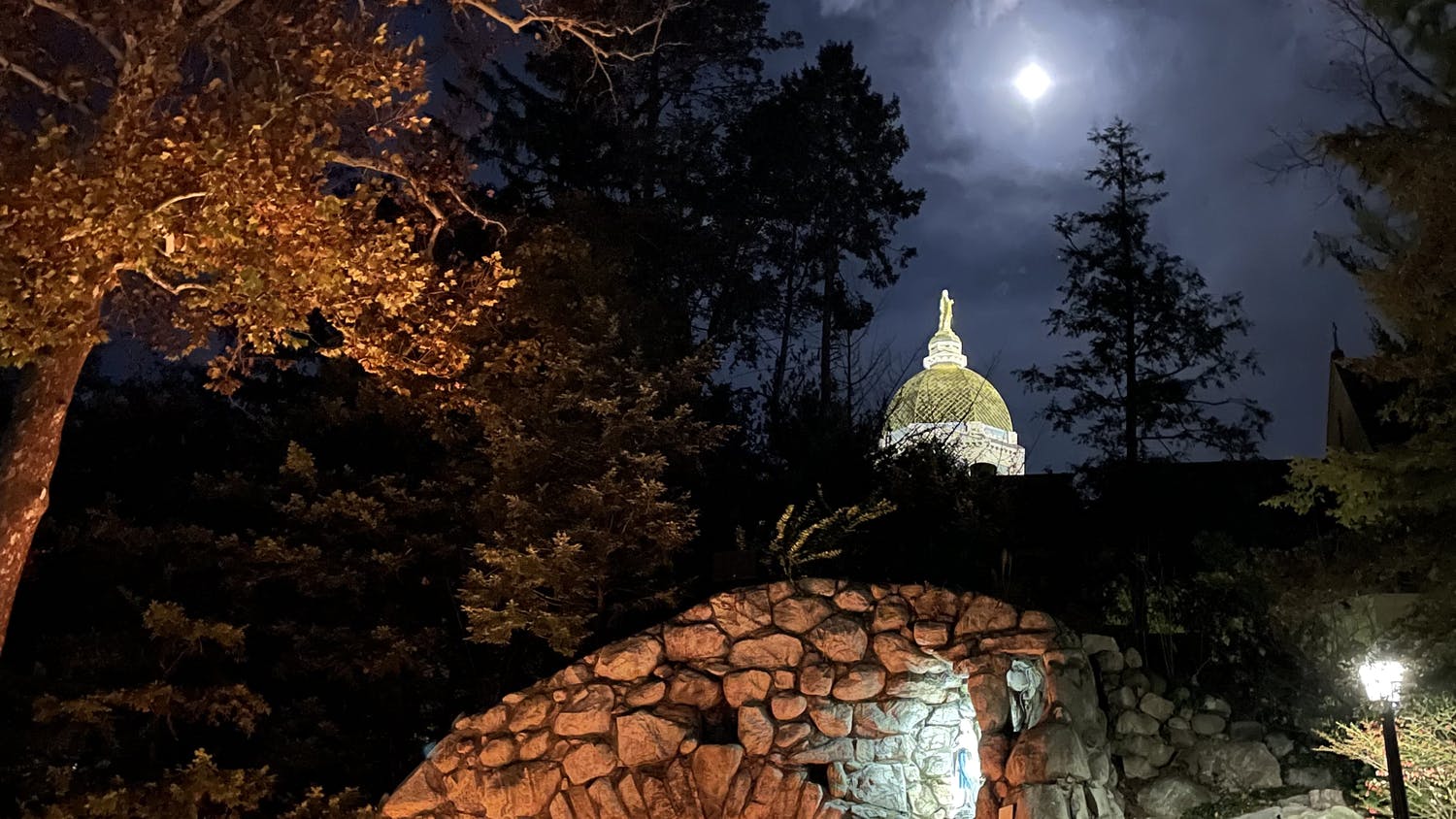Friday night, as chants of “Jesus loves all” and prayers of the rosary competed outside, the drag artist Blair St. Clair took stage in the Philbin Studio Theatre for an event entitled “What A Drag.” Crowds with signs and banners gathered to protest the performance, faced by others in a counterprotest.

St. Clair — the stage name used by Indiana native Andrew Allan Bryson — is known for competing on the reality competition series RuPaul’s Drag Race. The event was sponsored by the music department, American studies, the Gender Studies program, the Institute for Scholarship in the Liberal Arts, the Initiative on Race and Resilience and the department of film, television and theatre (FTT). The show took place despite weeks of criticism and controversy from members of the campus community.
Pamela Wojcik, FTT department chair, is teaching a one-credit elective called “Drag on Screen.” She described the show, which was presented after a symposium on drag bans Friday afternoon, as the “culmination” of her course.
Before the performance, Wojcik took to the stage to introduce the event.
“Welcome to Notre Dame’s first, and I’m betting last, drag show. Unless you count the Keenan Revue, which has been doing drag on this campus for decades,” she said. “If you want more drag shows on campus, by all means, make that noise. Talk to the administration. I’m not going to organize it, but you could. And that would be fabulous, and I think Legends should have drag night and it would be super, super fun.”
A Notre Dame student with the stage name Cordelia and London BaCall opened for St. Clair. All three drag queens performed two acts, dancing and lip-syncing in costume to Taylor Swift, Lady Gaga and others. The crowd of mostly students and faculty offered each of the performers standing ovations.
Outrage over the hosting of a drag queen at a Catholic university made national headlines, including through pieces in the National Catholic Register, Fox News, The American Spectator, Catholic News Agency and The Federalist.
Students organized a website called NoDragND.org, which included a form to send an email to University President Fr. John Jenkins and other administrators in protest against the event. Senior Merlot Fogarty wrote in a tweet that over 1,000 students, faculty, alumni and members of the Notre Dame community sent emails.
In April, the University denied the LGBTQ+ and Allies Club’s chosen performer for Mendoza College’s heritage and diversity ball. According to Christopher Hillak, the group’s club advisor, St. Clair was the same drag queen whom the club had sought to invite then.
“This is something that, in Mendoza, we had tried to do back in April, and we weren’t allowed to. And so it’s really exciting to see that FTT was able to pick up that banner and really do something more with it,” he said.
In the pages of The Observer, Fogarty and senior Madelyn Stout argued that funding a drag performance stood in opposition to the University’s values.
“University funding will be paying drag artists to come to Notre Dame, dress as women, defile femininity and most importantly, promote the disordered ideology that gender and sexuality are fluid,” they wrote.
The NoDragND.org website detailed plans of a protest against the event, including an attempt to claim tickets and walk out or not use the ticket to “save a soul from watching the debauchery.” Additionally, students recited the sorrowful mysteries of the rosary outside of the DeBartolo Performing Arts Center.
In response, event organizers canceled day-of ticket distribution and only allowed entry for those who had received tickets ahead of time.
Sam Marchand, a freshman, was among those protesting against the drag show.
“The fundamental Catholic character of the University needs to be defended from an administration that is too weak to resist modern pressures and temptations away from that character,” he said.
Sophomore Shri Thakur argued that defending the event as academic freedom was not sufficient.
“We all agree that there’s certain ideas, certain events that can’t be permitted on campus, and this is certainly one of them, because it goes directly against Catholic ideology and Catholic teaching on human sexuality,” he said.
Doug Abell, a senior, was part of the counterprotest defending the drag performance. He said he originally came to see the performance after hearing about the show from his roommates who stood on the opposite side of the protest.
The controversy was the result of misconception, Abell said.
“It’s a misunderstanding of what drag actually means to people and the queer community in general. People don’t understand what it is and how it’s just people in the community dressing up and like having a good time. I don’t really see anything inherently wrong with that from a Catholic perspective,” he said.
“I grew up Catholic my entire life. So I think it’s a misunderstanding, and people should educate themselves a little more before coming out here and counterprotesting a drag show. Yeah, like, can we just all have fun?”
Geo Tabet, a senior, stood outside the venue with a pride flag.
“I do understand that we are a Catholic university, but that doesn’t mean that we don’t pioneer education, and education comes from being exposed to all these different viewpoints,” he said.
He argued Notre Dame is an educational institution first and foremost, and then it is Catholic.
“Should we cancel the Keenan Revue because guys in that dress in drag? Should we cancel any course that focuses on comparative religion like Islam and Christianity because Islam is not within the Catholic social thought?” he argued.
In a response to student complaints, Fr. Gerry Olinger, vice president of student affairs, wrote that academic freedom applied because the event was related to a course.
“This freedom in academic contexts is critical, and the University protects this freedom even when the content of the presentation is objectionable to some or even many. Because the event you reference is part of a one-credit course in film, television and theatre on the History of Drag, the principle of academic freedom does apply in this instance,” he wrote.
In an interview with The Observer, Wojcik defended the event and her course, saying they were important for academic discourse.
“Academic freedom is a value at this University. And this is a legitimate academic subject. There are numerous academic books and articles about drag. Written in the context of queer theory, queer history, feminist theory, feminist history,” she said.
Wojcik alleged a “bombardment campaign” from critics of the event.
“It’s a hate campaign. And I don’t think it’s honest about what they think their objections to drag are, even if it is honest,” Wojcik said.
She defended drag as an entertainment form, arguing it does not challenge Notre Dame’s values.
“It’s not pornographic, it’s not misogynist, it’s not anti-Catholic in any way. It’s not about religion. It’s an entertainment form, and the version that we will be seeing will be primarily glamour and lip-syncing. A sense of play and fun and theatricality,” she said before the event.
At the protest, Fogarty said she also believed in academic freedom, but that a drag performance funded by University departments did not qualify.
“Freedom of expression is not protected if it is harassing or inciting violence against a certain sector of the University, or any sector of the population, and drag harasses women. It takes what it is to be a woman and puts it on stage and mocks it,” she said.
Editor’s Note: Ryan Peters contributed to this report.
Drag queens perform at DPAC amid outrage and protest
Protesters outside the Debartolo Performing Arts Center hold signs that say drag performances are “sin” and “impurity.”
Counterprotesters wave rainbow flags and dress in an array of colors to show support for the drag performance.
A counter protester displays a rainbow flag to symbolize pride for the LGBTQ+ movement.
Protesters stand outside the DeBartolo Performing Arts Center on Friday evening.









